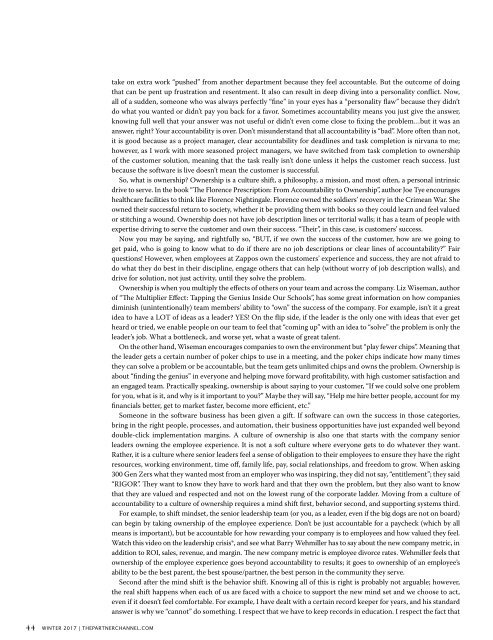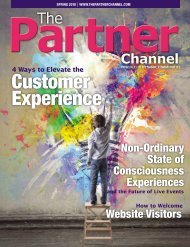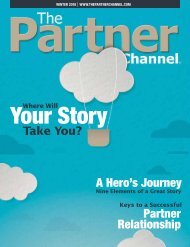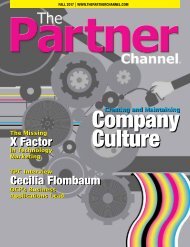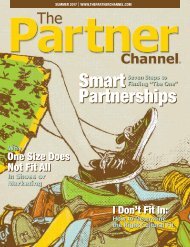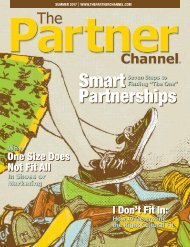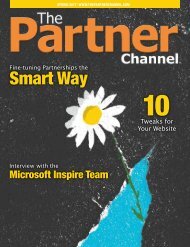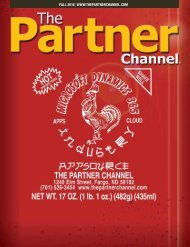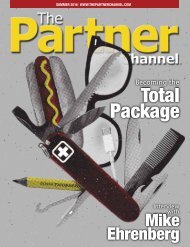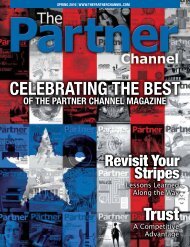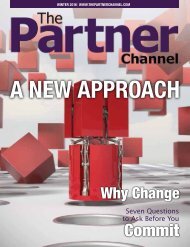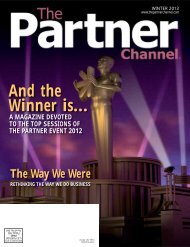The Partner Channel Magazine Winter 2017
The more things change, the more things stay the same. Now that we've had a few months after the Dynamics 365 product launch, this issue takes a look at this concept in a variety of ways; Whether that's how you treat customers or implement tried and true best practices in marketing.
The more things change, the more things stay the same. Now that we've had a few months after the Dynamics 365 product launch, this issue takes a look at this concept in a variety of ways; Whether that's how you treat customers or implement tried and true best practices in marketing.
Create successful ePaper yourself
Turn your PDF publications into a flip-book with our unique Google optimized e-Paper software.
44 WINTER <strong>2017</strong> | THEPARTNERCHANNEL.COM<br />
take on extra work “pushed” from another department because they feel accountable. But the outcome of doing<br />
that can be pent up frustration and resentment. It also can result in deep diving into a personality conflict. Now,<br />
all of a sudden, someone who was always perfectly “fine” in your eyes has a “personality flaw” because they didn’t<br />
do what you wanted or didn’t pay you back for a favor. Sometimes accountability means you just give the answer,<br />
knowing full well that your answer was not useful or didn’t even come close to fixing the problem…but it was an<br />
answer, right? Your accountability is over. Don’t misunderstand that all accountability is “bad”. More often than not,<br />
it is good because as a project manager, clear accountability for deadlines and task completion is nirvana to me;<br />
however, as I work with more seasoned project managers, we have switched from task completion to ownership<br />
of the customer solution, meaning that the task really isn’t done unless it helps the customer reach success. Just<br />
because the software is live doesn’t mean the customer is successful.<br />
So, what is ownership? Ownership is a culture shift, a philosophy, a mission, and most often, a personal intrinsic<br />
drive to serve. In the book “<strong>The</strong> Florence Prescription: From Accountability to Ownership”, author Joe Tye encourages<br />
healthcare facilities to think like Florence Nightingale. Florence owned the soldiers’ recovery in the Crimean War. She<br />
owned their successful return to society, whether it be providing them with books so they could learn and feel valued<br />
or stitching a wound. Ownership does not have job description lines or territorial walls; it has a team of people with<br />
expertise driving to serve the customer and own their success. “<strong>The</strong>ir”, in this case, is customers’ success.<br />
Now you may be saying, and rightfully so, “BUT, if we own the success of the customer, how are we going to<br />
get paid, who is going to know what to do if there are no job descriptions or clear lines of accountability?” Fair<br />
questions! However, when employees at Zappos own the customers’ experience and success, they are not afraid to<br />
do what they do best in their discipline, engage others that can help (without worry of job description walls), and<br />
drive for solution, not just activity, until they solve the problem.<br />
Ownership is when you multiply the effects of others on your team and across the company. Liz Wiseman, author<br />
of “<strong>The</strong> Multiplier Effect: Tapping the Genius Inside Our Schools”, has some great information on how companies<br />
diminish (unintentionally) team members’ ability to “own” the success of the company. For example, isn’t it a great<br />
idea to have a LOT of ideas as a leader? YES! On the flip side, if the leader is the only one with ideas that ever get<br />
heard or tried, we enable people on our team to feel that “coming up” with an idea to “solve” the problem is only the<br />
leader’s job. What a bottleneck, and worse yet, what a waste of great talent.<br />
On the other hand, Wiseman encourages companies to own the environment but “play fewer chips”. Meaning that<br />
the leader gets a certain number of poker chips to use in a meeting, and the poker chips indicate how many times<br />
they can solve a problem or be accountable, but the team gets unlimited chips and owns the problem. Ownership is<br />
about “finding the genius” in everyone and helping move forward profitability, with high customer satisfaction and<br />
an engaged team. Practically speaking, ownership is about saying to your customer, “If we could solve one problem<br />
for you, what is it, and why is it important to you?” Maybe they will say, “Help me hire better people, account for my<br />
financials better, get to market faster, become more efficient, etc.”<br />
Someone in the software business has been given a gift. If software can own the success in those categories,<br />
bring in the right people, processes, and automation, their business opportunities have just expanded well beyond<br />
double-click implementation margins. A culture of ownership is also one that starts with the company senior<br />
leaders owning the employee experience. It is not a soft culture where everyone gets to do whatever they want.<br />
Rather, it is a culture where senior leaders feel a sense of obligation to their employees to ensure they have the right<br />
resources, working environment, time off, family life, pay, social relationships, and freedom to grow. When asking<br />
300 Gen Zers what they wanted most from an employer who was inspiring, they did not say, “entitlement”; they said<br />
“RIGOR”. <strong>The</strong>y want to know they have to work hard and that they own the problem, but they also want to know<br />
that they are valued and respected and not on the lowest rung of the corporate ladder. Moving from a culture of<br />
accountability to a culture of ownership requires a mind shift first, behavior second, and supporting systems third.<br />
For example, to shift mindset, the senior leadership team (or you, as a leader, even if the big dogs are not on board)<br />
can begin by taking ownership of the employee experience. Don’t be just accountable for a paycheck (which by all<br />
means is important), but be accountable for how rewarding your company is to employees and how valued they feel.<br />
Watch this video on the leadership crisis*, and see what Barry Wehmiller has to say about the new company metric, in<br />
addition to ROI, sales, revenue, and margin. <strong>The</strong> new company metric is employee divorce rates. Wehmiller feels that<br />
ownership of the employee experience goes beyond accountability to results; it goes to ownership of an employee’s<br />
ability to be the best parent, the best spouse/partner, the best person in the community they serve.<br />
Second after the mind shift is the behavior shift. Knowing all of this is right is probably not arguable; however,<br />
the real shift happens when each of us are faced with a choice to support the new mind set and we choose to act,<br />
even if it doesn’t feel comfortable. For example, I have dealt with a certain record keeper for years, and his standard<br />
answer is why we “cannot” do something. I respect that we have to keep records in education. I respect the fact that


